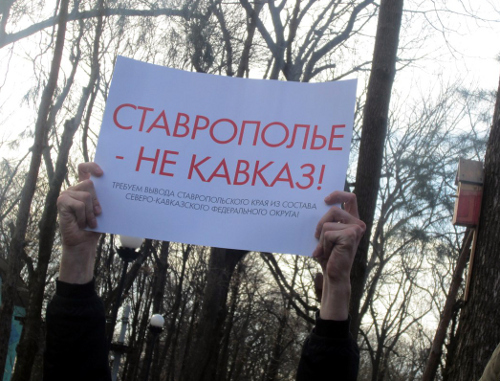
Russian Movement in Stavropol Calls for Creation of Russian Republic
Publication: Eurasia Daily Monitor Volume: 10 Issue: 158
By:

A political movement in Stavropol region is gearing up for the establishment of a Russian republic in this ethnic Russian–majority territory, thereby emulating the ethnically non-Russian republics of the North Caucasus. The first conference of the Slavs of Stavropol, also known as the Russian People’s Assembly, is scheduled to take place on November 4 in the city of Stavropol. An estimated 500 delegates are expected to attend the gathering.
The principal issue that concerns Russian nationalists in Stavropol is the influx of ethnically non-Russian North Caucasians and the strategic retreat of ethnic Russians from Stavropol region, especially from its eastern and the southeastern areas. “No one asked the population of Stavropol region for their consent for the region’s withdrawal from the Southern Federal District and joining it with the North Caucasian republics,” one of the organizers of the conference, Sergei Popov, asserted. The activist emphasized that ethnic Russian people should therefore follow the example of the North Caucasians by organizing on an ethnic basis. Popov claimed Moscow is treating Stavropol region “like a reserve for the development of the neighboring [North] Caucasian republics and not as a separate entity” (https://www.ng.ru/regions/2013-09-06/6_stavropolie.html).
Stavropol region is the only ethnic Russian–majority region within the North Caucasian Federal District. Soon after the new district was established in 2010, various Russian groups started to demand that Stavropol be transferred back to the Southern Federal District. Moscow was reluctant to allow such a transfer because the borders of the North Caucasus Federal District without the Stavropol region would have resembled an international border, almost perfectly aligning with the distribution of ethnic groups. Stavropol region has nearly 3 million people and is about the same size as the largest republic of the North Caucasus, Dagestan. As Russian nationalists have failed to convince Moscow to separate the region from the North Caucasus, they now appear intent on establishing a Russian republic within the North Caucasus Federal District.
The organizers of the movement for the establishment of a Russian republic in Stavropol region include a loose coalition of Cossack and Russian nationalist groups. The two primary organizations are Russian Unity of the Caucasus and Novaya Sila (New Power). Russian Unity of the Caucasus was founded in December 2010 by Cossack groups that were not approved for government financing and Russian nationalist groups from the republics and southern Russian territories (https://www.regnum.ru/news/1358572.html). The officially unregistered Novaya Sila party is another driving force behind the conference (https://novayasila.org). The party has been very active in Stavropol region in the past year, organizing protests in the city of Nevinnomysk in December 2012 following the killing of an ethnic Russian by an ethnic Chechen (https://www.kp.ru/daily/26005/2931401/). The leader of Novaya Sila, Valery Solovei, who is a professor at Moscow State Institute of International Relations (a.k.a. MGIMO), is known for his right-wing nationalist views, while MGIMO has traditionally been known for its ties to the Russian security services.
Among the main causes of the popular discontent in Stavropol region is its economic backwardness and shifts in the population’s demographic structure. Having considerable natural and population resources, Stavropol region is doing significantly worse than its wealthy neighbors to the west and north, Krasnodar and Rostov-on-Don regions. In particular, foreign investment never took off in Stavropol despite expansive initial plans and opportunities.
So, on the one hand, ethnic Russians who live in Stavropol region are incentivized to leave for other Russian regions in search of better economic opportunities (https://kavpolit.com/polnyj-stabilizec/). On the other hand, Stavropol is attractive for the North Caucasians because its economy is still better relative to the North Caucasus. Also, the Stavropol region is the closest large region with a low population density, so the inflow of North Caucasians and the outflow of ethnic Russians have economic and geographic explanations.
The continuing efforts of ethnic Russian activists in Stavropol region to affirm the region’s ethnic Russian identity suggest that ethnic Russians believe the government’s efforts to ensure the unity of the Russian Federation are failing. They evidently perceive North Caucasians not as fellow Russian citizens, but rather as ethnic “others” and hostile invaders. Even more importantly, the push for creating a Russian republic in Stavropol region may have significant implications for Russia as a whole. The possible establishment of a Russian republic in Stavropol would have a far more profound effect on the current Russian political system than the earlier movements for separation from the North Caucasus Federal District. Indeed, if Stavropol were to succeed in creating a Russian republic, other Russian regions would certainly follow suit, especially the neighboring Russian-majority regions of Krasnodar and Rostov-on-Don. A proliferation of Russian republics would in turn undermine the highly hierarchical and centralized structure of political power in Russia.
True federalization of Russia would probably be the greatest revolution in the country to date, and would completely change it. This shows that Russian nationalism is one of the forces in Russia that may contribute to the country’s democratization. Even Russian liberal leaders, such as chess grandmaster and leading opposition figure Garry Kasparov, have warmed up to the Russian nationalist idea of separating the North Caucasus from Russia (https://www.kasparov.ru/material.php?id=5228308F4EA0E).
Admittedly, apart from democratization, growing Russian nationalism may also result in the separation of the North Caucasus from Russia, as Moscow may realize that it is better to part with the North Caucasus than face a proliferation of Russian republics throughout the country. Since ethnic non-Russians, particularly the North Caucasians, are seen as hostile and unwanted elements in the Russian-majority territories, the North Caucasians are increasingly likely to respond by building their own ethnic homes where they can survive with some level of comfort.




